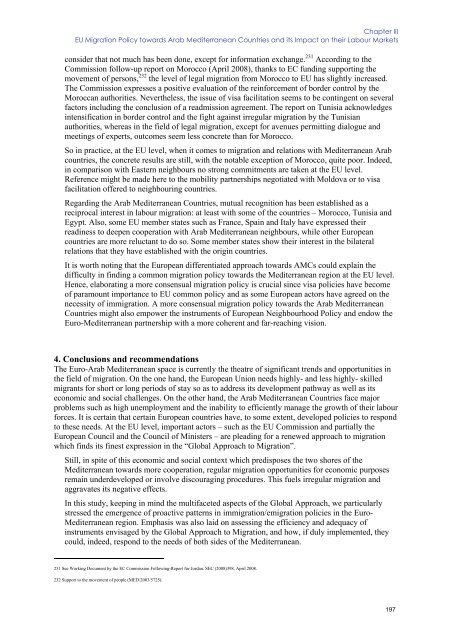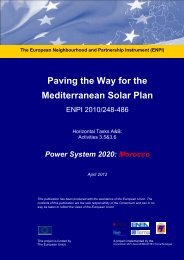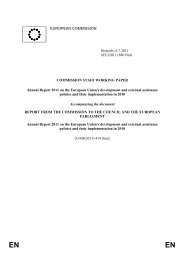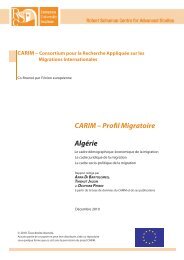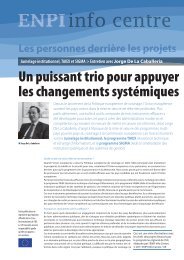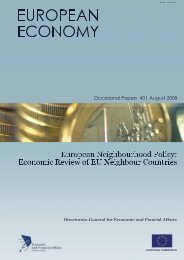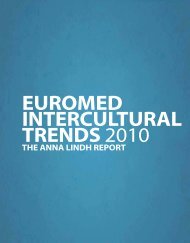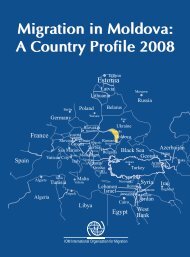Labour market performance and migration flows - European ...
Labour market performance and migration flows - European ...
Labour market performance and migration flows - European ...
You also want an ePaper? Increase the reach of your titles
YUMPU automatically turns print PDFs into web optimized ePapers that Google loves.
Chapter IIIEU Migration Policy towards Arab Mediterranean Countries <strong>and</strong> its Impact on their <strong>Labour</strong> Marketsconsider that not much has been done, except for information exchange. 231 According to theCommission follow-up report on Morocco (April 2008), thanks to EC funding supporting themovement of persons, 232 the level of legal <strong>migration</strong> from Morocco to EU has slightly increased.The Commission expresses a positive evaluation of the reinforcement of border control by theMoroccan authorities. Nevertheless, the issue of visa facilitation seems to be contingent on severalfactors including the conclusion of a readmission agreement. The report on Tunisia acknowledgesintensification in border control <strong>and</strong> the fight against irregular <strong>migration</strong> by the Tunisianauthorities, whereas in the field of legal <strong>migration</strong>, except for avenues permitting dialogue <strong>and</strong>meetings of experts, outcomes seem less concrete than for Morocco.So in practice, at the EU level, when it comes to <strong>migration</strong> <strong>and</strong> relations with Mediterranean Arabcountries, the concrete results are still, with the notable exception of Morocco, quite poor. Indeed,in comparison with Eastern neighbours no strong commitments are taken at the EU level.Reference might be made here to the mobility partnerships negotiated with Moldova or to visafacilitation offered to neighbouring countries.Regarding the Arab Mediterranean Countries, mutual recognition has been established as areciprocal interest in labour <strong>migration</strong>: at least with some of the countries – Morocco, Tunisia <strong>and</strong>Egypt. Also, some EU member states such as France, Spain <strong>and</strong> Italy have expressed theirreadiness to deepen cooperation with Arab Mediterranean neighbours, while other <strong>European</strong>countries are more reluctant to do so. Some member states show their interest in the bilateralrelations that they have established with the origin countries.It is worth noting that the <strong>European</strong> differentiated approach towards AMCs could explain thedifficulty in finding a common <strong>migration</strong> policy towards the Mediterranean region at the EU level.Hence, elaborating a more consensual <strong>migration</strong> policy is crucial since visa policies have becomeof paramount importance to EU common policy <strong>and</strong> as some <strong>European</strong> actors have agreed on thenecessity of im<strong>migration</strong>. A more consensual <strong>migration</strong> policy towards the Arab MediterraneanCountries might also empower the instruments of <strong>European</strong> Neighbourhood Policy <strong>and</strong> endow theEuro-Mediterranean partnership with a more coherent <strong>and</strong> far-reaching vision.4. Conclusions <strong>and</strong> recommendationsThe Euro-Arab Mediterranean space is currently the theatre of significant trends <strong>and</strong> opportunities inthe field of <strong>migration</strong>. On the one h<strong>and</strong>, the <strong>European</strong> Union needs highly- <strong>and</strong> less highly- skilledmigrants for short or long periods of stay so as to address its development pathway as well as itseconomic <strong>and</strong> social challenges. On the other h<strong>and</strong>, the Arab Mediterranean Countries face majorproblems such as high unemployment <strong>and</strong> the inability to efficiently manage the growth of their labourforces. It is certain that certain <strong>European</strong> countries have, to some extent, developed policies to respondto these needs. At the EU level, important actors – such as the EU Commission <strong>and</strong> partially the<strong>European</strong> Council <strong>and</strong> the Council of Ministers – are pleading for a renewed approach to <strong>migration</strong>which finds its finest expression in the “Global Approach to Migration”.Still, in spite of this economic <strong>and</strong> social context which predisposes the two shores of theMediterranean towards more cooperation, regular <strong>migration</strong> opportunities for economic purposesremain underdeveloped or involve discouraging procedures. This fuels irregular <strong>migration</strong> <strong>and</strong>aggravates its negative effects.In this study, keeping in mind the multifaceted aspects of the Global Approach, we particularlystressed the emergence of proactive patterns in im<strong>migration</strong>/e<strong>migration</strong> policies in the Euro-Mediterranean region. Emphasis was also laid on assessing the efficiency <strong>and</strong> adequacy ofinstruments envisaged by the Global Approach to Migration, <strong>and</strong> how, if duly implemented, theycould, indeed, respond to the needs of both sides of the Mediterranean.231 See Working Document by the EC Commission Following-Report for Jordan. SEC (2008)398, April 2008.232 Support to the movement of people (MED/2003/5725).197


